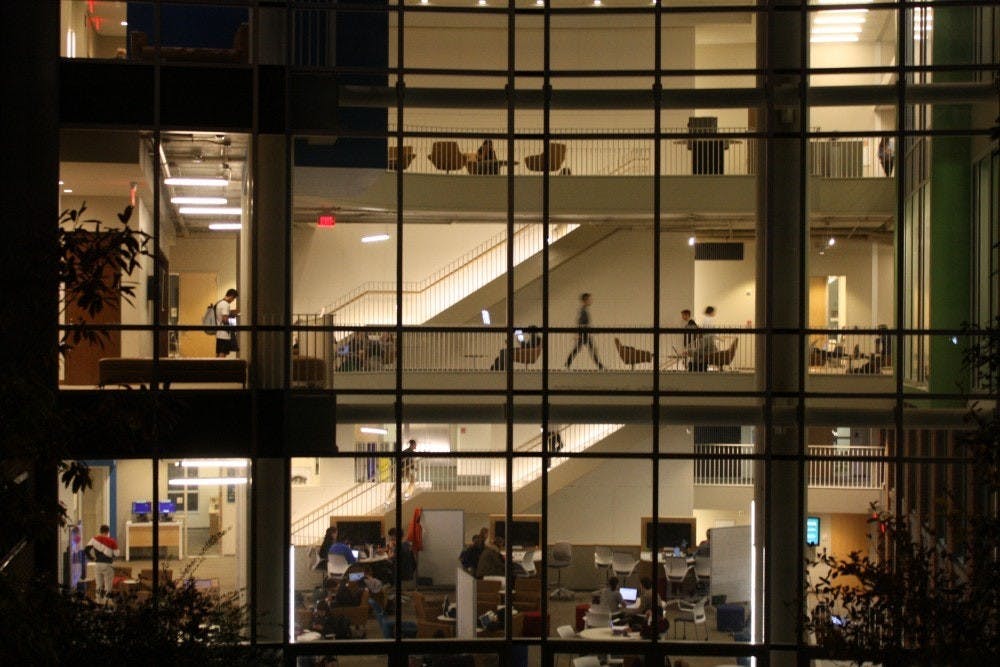Sapere aude!” Immanuel Kant screams at me from his essay on enlightenment. “Have the courage to think for yourself.”
I look up from my desk on D-Level and feel the bones in my neck crack. It’s been a while since I’ve seen the sun, so I’m pretty sure you can use the fluorescent lights to see through my skin and into my vital organs.
Think for yourself. That sounds like pretty good advice, but who has the time?
I’m a workaholic. I’ve spent many a weekend, late night and early morning in the dark recesses of the library. I’ve fallen asleep while reading in bed and woken up with highlighter all over my face. I’ve cried in Gilman because I couldn’t make my rhyming couplets work before a deadline, and it is more than fair to say that, at times, I’ve bitten off more than I could chew.
At Hopkins, I’m surrounded by hundreds of other students who are just like me.
Usually when people ask what it’s like to go to Hopkins (after I clarify that I am, in fact, not pre-med or in medical school) I say something like this: “The average Hopkins student is a workhorse. They’re really passionate about what they do, but it’s a lot of hard work.” Maybe at Harvard, the hardest part is getting in, but not here. We work, damn it!
This depiction of the Hopkins ethos is admittedly cutesy, but what’s lurking behind all that bravado is that most, if not all of us, are overworked.
In some sense, that’s because Hopkins draws a specific type of student. Our University’s admissions officers know the type of students who will work hard and do well here, and those are inevitably the people who get in. Odds are most of us came to Hopkins looking for a challenge, and boy have we got one.
Almost a year ago, Hopkins officials released their preliminary findings from the Task Force on Student Mental Health and Well-being. In it, their data pointed out a few areas in which we differ from students at Ivy League universities and other peer institutions in general.
Apparently, a greater percentage of students at Hopkins feel overwhelmed “very often” than at Ivy Leagues and other peer institutions. A greater percentage of Hopkins undergrads pull all-nighters “often” or “very often” than students at Ivy Leagues and other peer institutions, and a greater percentage of students at Hopkins than at Ivy Leagues and other peer institutions responded that they felt their workload was “very stressful” and that they found the future to be — wait for it — also “very stressful.”
Though we can hold the administration responsible for lack of attention and funding toward mental health resources, there’s one guilty party who normally gets off scot free: us.
In my almost four years at Hopkins, the mental health culture has changed enormously. During my first semester, I felt like I was drowning in a silent pool of anxiety. I didn’t have a single professor who acknowledged that college can be overwhelming at its best and soul crushing at its worst.
Nowadays, my course syllabi provide links to mental health resources on campus. Last week, I had a professor tell me it was fine I decided not to do something because my mental health was more important.
So if the culture, or at least some of the professors, has changed, why do most of us still feel so burnt out?
Even though the culture of Hopkins might exist before we get here, we students are the ones who perpetuate our toxic culture of overwork. Then we leave it in place for future classes. I know I’m guilty of entering into bragathons with friends about who got the least amount of sleep last night or who has the most reading to do.
The thing is, we don’t have to participate in these toxic conversations. We are students, not contestants on Survivor. We need to learn to take better care of ourselves.
Complaining can be cathartic, but it when it becomes habitual, we normalize it and don’t think about how to do better the next day. Breaking this cycle is hard, but at the end of the day it comes down to all of us choosing to prioritize our mental health.
For my own part, I know what helped me more than anything else was an awesome therapist, letting go of my ego, and ultimately realizing that sleep and sanity were more important than reading every page I was assigned. We’re all out here working nonstop, but sometimes you have to step back and think for yourself.
Sarah Crum is a senior majoring in Writing Seminars and minoring in Philosophy from Littleton, Colo.





